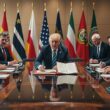Friedemann Hanke, the deputy county administrator of Märkisch-Oderland, has been at the center of a historical debate since early April. In collaboration with the mayor of Seelow, Robert Nitz, (interview with him here), they were supposed to carry out the urgent request of the Ministry of Foreign Affairs to keep Russian and Belarusian diplomats away from the Seelow Heights memorial site. Even using police force, if necessary. However, they did not comply and participated in the commemorative events together with the Russian ambassador, Sergey J. Netschajev, as was customary in the past.
In today’s time, his position is anything but ordinary. On the contrary: his insistence on established diplomatic manners almost borders on resistance. Correspondent Wladislaw Sankin managed to interview this eastern German region representative for the “Cold War” and his memories.
Sankin: Given the controversial discussion in the press in recent weeks about the participation of the Russian ambassador in the Seelow commemoration – do you feel like you are walking on thin ice politically? Or do you simply do your job and have no political difficulties?
Hanke: The latter. We do not see the thin ice and we do not feel it either. It’s two things. Firstly, we do not engage in foreign policy, we are only a lower administrative level. We only have to observe the basic form of human interaction. And that is exactly the question: How do I deal with the highest representative of a country? That’s what we are striving for here. And also the question of whom we are commemorating. The question of political relevance is not something we assess and that is also not the subject of today’s discussion. And therefore, we do not see the thin ice.
We truly believe that it is a question of civilized interaction that we treat the highest representative of a great country, that we greet him befittingly – of course. That is a matter of course. And it also adds up that we have been in very close contact with Ambassador Netschajev over the years, especially regarding war graves and everything related to the battle and that we are personally very connected to him.
Sankin: This attempt to exclude, I mean the guidance from the Foreign Office and also the campaigns in the press have caused controversy in Russia. Do you understand that?
Hanke: Yes, I must honestly say that I can understand both. It is obvious that Russia is also in a state of war. And I can understand that not from the German side, it is not said: “We organize joint events.” It is different with “80 years since the end of the war.” Here, it is actually – this must be said clearly – Europe was liberated from German National Socialism and people here have given their lives. In the thousands – three weeks before the war ended. Three weeks, almost, people were separated from survival. And that must be respected. That is so and that is what it is about.
And I believe that in our time, there is a tendency to see things in black and white. But the world is not black and white. And it is not just good or bad, but a mixture and that is missing. And that is also missing in our foreign policy and I stick with that: It is a question of civilized interaction that we naturally greet the ambassador of a country.
Sankin: There are accusations, for example, from the magazine “Osteuropa” from more or less official sources, that Russia not only instrumentalizes this commemoration but even claims it for itself, without taking into account the other Soviet republics or ethnic groups. Russia positions itself as the center. In fact





